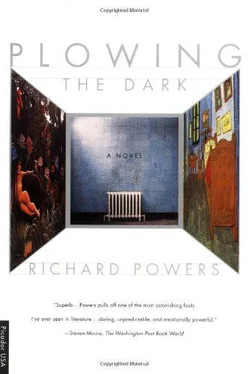A little higher, she called out. To figure in the blankets and headboards.
Nothing in this voice still hinted at its precursor, the voice that had long ago told Spiegel, "Well, if you write, you ought to come to our Tuesday nights. In fact, I'm surprised I haven't seen you there before now."
"I mostly keep to myself. I work in a style that isn't really… fashionable these days."
Her eyes widened, bestowing on him their full prize. "In that case, you have to come."
Anything worth devoting a lifetime to, young Stevie figured, might require as many as three days to master. Since the next Tuesday soiree was five days away, he was still in reasonable shape. He hadn't written verse since a hit-and-run sonnet accident in senior year of high school. But as with all other problem sets, he did his best work under the gun.
He showed up at the girl's apartment — a funky, carved-up Victorian boardinghouse near Lake Mendota — on Tuesday night, nerves shattered by caffeine, folding and unfolding a spayed scrap of mongrel doggerel that was probably prosecutable under even the most generous interpretation of the Intellectual Property Protection Act. His spot of manic plagiarism was all the more alarming for being at least as incoherent as it was shameless, a "Sailing to Byzantium" in leg-weighted waltz time. And he dragged this little ditty into a room draped in more black than a Greek Orthodox Good Friday service.
What is it about black? he asked the woman, seventeen years later, as they waited for Jackdaw to dummy up the place holder that stood where the bedside chair soon would. Black and the art scene? The fad that refuses to die. Why has every trendy crowd for the last two centuries embraced it?
She smiled at him, preoccupied. It's the perfect preemptive look, all-black. What you wear when you're not sure what the other guy is going to wear. Deeply conservative, passing as Rad. Why do you ask? she asked.
He'd sat there, at twenty, dying a million Oxford button-down deaths while reincarnated greasers and beatniks took turns presenting their "work" and laying themselves open to the flagellation of their peers. Poetry, prose, sculpture, music, pictures: he'd underestimated the spread of the contagion. He'd stepped into the middle of an old blood feud, warring family factions contesting the last will and testament of this dead, penniless patriarch, Art.
The terms of the fight were obscure, even to those who had been at it for years before Spiegel blundered on the scene. But the war seemed to come down to whether that liberating anagram, now just five days old inside him, should be indulged freely or called to answer for those same abuses of privilege and power that had trashed the rest of the world. It opened Spiegel's eyes. Art was embroiled in the same conflict that had claimed the Army Math.
Aside from wanting to avoid his own all-expenses-paid trip to Southeast Asia, Spiegel had no real political agenda. He'd hoped this aesthetics thing would be relatively simple. Now the night was forcing him to take sides, to declare his allegiances on issues he couldn't even decode. All he knew was that he'd sooner stick his head in a gas oven than read aloud in front of this tribunal.
Forty minutes into the street-fighting, during an especially ugly exchange over the political irresponsibility of a bleary chalk abstraction, a short, stocky guy swaggered into the room wearing a Bucky Badger sweatshirt and toting a dirty gym bag. Talk broke off, and all eyes fixed on the infidel. The fellow reached slowly into his sack and withdrew a damp jock strap.
"This is my piece," he announced. "It's a conceptual work." Protagonists of both stripes shouted the man down. He heckled back, creatively, in kind, and the session mercifully degenerated. Ted Zimmerman: the only name that stuck with Spiegel from that evening. The only person he cared to talk to afterward. A study in fearless delight. The man who saved Spiegel from having to read his first adult poem out loud in front of a room of hired aesthetic killers, there in war-torn Madison.
"My God, you vanquished them," Spiegel told Zimmerman, out on the chill front steps of the Victorian. "Three cheers." "Vanquished?" Zimmerman asked.
For one uncertain second, Spiegel thought he'd misread everything. He gestured inside. "The war between art and ethics."
"Oh." Ted's nod went sardonic. "Mutual coercion versus mutual communion. Whose side are you on?"
"I wish I knew. So what do you do?" Nothing if not a quick study. "I play handball. And I'm working on a damn octet on the side. Confessions of an apolitical man. You?"
"I do poetry." A lie he'd do penance for, by making it come true. Ted proceeded to grill Stevie about everyone he'd ever read. "Yeats is fine. But man cannot live by fruitcake alone. Have you read Rilke?
Have you read George?" Spiegel shook his head knowingly, trying to memorize the names.
They graduated to novels, plays, essays. Zimmerman held forth on Habermas and Musil. He quoted from Man and Superman, delivered a brief history of the Successionist movement, and glossed over chiti-nous Frankfurt School tracts. To Steve, half the people the man mentioned were total ciphers. Talk graduated to concert music, Ted's real passion. Spiegel caught the names Schoenberg, Webern, and Berg, whom he gathered were a kind of upscale Tinker to Evers to Chance. By the time they stood up from the cold steps, Spiegel had both a handball date and a considerable homework assignment.
"Time to go home," the composer announced. He breathed the night deeply into his lungs. "The two hours on either side of midnight. My favorite time in the day to nudge a piece forward." "Mine too," Spiegel decided.
"Thanks for the words," Ted said. "We live our lives in hope of the company of women. But barring that, an amusing man."
Spiegel ran up against the line again a year later, still plowing through his friend's reading list. It jumped out at him, underlined, from Zimmerman's beaten-up copy of Women in Love.
Inside the house, the black-clad crowd still hashed out the morality of depiction, just as their affiliated revolutionary cells did, by the tens of thousands, in accredited institutions across the face of the divided country. Things showed no sign of reaching consensus anytime before daybreak. Spiegel found his hostess and thanked her for the entree. The life-changing introduction. "Make a friend?" Adie asked.
Spiegel shook his head, dazed. "The man's a genius." Her eyebrows plunged. "Ted? Ted's a pleasure lover." The indictment sounded forgiving, as if the disease could infect even vigilant people. Spiegel felt himself deeply and beautifully at sea.
"You should give him a chance," he said. "Sit down and talk to him. It's amazing. Like trying to converse with a whole hive of social insects, crawling in all directions."
"Oh, Ted and I used to talk together pretty regularly." The girl held Spiegel in a wary stare. The look dismantled and reassembled him.
"Then what happened?"
"Then we started sleeping together."
His stomach pitched. He was at sea with the obvious. Everything good, everything transforming about this evening would be lost. Already, he loved both these strangers too much to choose between them. And he was still too young to know that choice was never an option.
Weeks passed before he caught painter and composer alone together. Neither would talk to him about the other. Spiegel wondered whether Adie was one of those muses to creative men who did all the actual creation herself. But there was something more to that relationship, something each gave the other that Spiegel couldn't quite name. Their mutual, gravitational pull passed through crowded rooms, without a single signal passing between them. Their closeness sailed forth, silent, invisible, painstaking — like the intimacy both of them struck with the things they made.
Читать дальше












